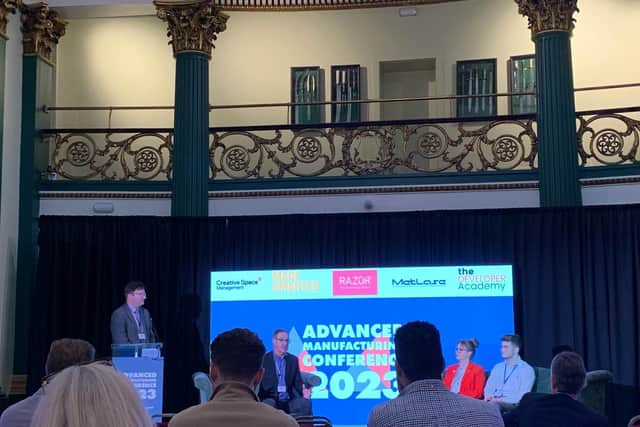Why Britain needs a long term industrial strategy to boost advanced manufacturing: Greg Wright
Joseph, who is an award-winning apprentice and junior automation engineer at ITM Power, was one of the stars of The Yorkshire Post’s Advanced Manufacturing Conference, which attracted a full house to the Cutlers Hall in Sheffield. He spoke passionately about his career journey, which has taken him to the heart of a company which is providing long term, sustainable jobs in manufacturing. If the UK’s economy is to prosper, we need thousands of young people like him.
I chaired the panel discussion which featured Joseph and was deeply impressed by his maturity and eloquence. Sadly, the debate – which focused on the economic future of advanced manufacturing – also highlighted concerns about gaps in Government policy.
Advertisement
Hide AdAdvertisement
Hide AdIn particular, Jim Davison, the national membership director of the manufacturers’ organisation Make UK, was exasperated by the lack of an industrial policy.


Speaking after the event, Mr Davison said: “We are the only industrialised nation that doesn't have such a thing. Government naturally talks about health policy and strategies, but it has neglected for too long industrial policy. The challenge is that we need to grow manufacturing from 10 per cent of GDP to 15 per cent to deliver the opportunity of the emerging technologies, but to head off the fundamental challenges, we need to do that in a joined up way, hence an industrial strategy is so important.”
New data revealed that UK factory production has witnessed the longest period of decline since the global financial crisis, although the speed at which the manufacturing industry is shrinking slowed slightly in October. The closely watched S&P Global/CIPS UK manufacturing PMI survey rose from 44.3 in September to 44.8 last month. Production output fell for the eighth month in a row, the longest sequence of continual decline since 2008 to 2009, the survey revealed.
Fhaheen Khan, senior economist at Make UK, said: “Until recently, manufacturers have been reliant on a backlog of work that has kept industry’s ship afloat, even at the worst of times. Now, however, it is becoming evident that the tides are beginning to sway against the sector’s progress with expectations for the coming year becoming more unfavourable by the day, especially in the continued absence of a long term industrial strategy from Government.”
Advertisement
Hide AdAdvertisement
Hide AdSo what is the Government’s plan? If you visit the House of Commons library, it tells you that the Government's industrial strategy, which was published in 2017, included policies to stimulate research and development, boost productivity and devise local industrial strategies.
In March 2021, the 2017 industrial strategy was replaced by the Treasury’s Plan for Growth, which aims to help Britain’s economy power ahead by supporting infrastructure, skills and innovation. This plan is laudable, but the Government cannot easily dismiss the concerns raised by Make UK about the perceived absence of a long term strategy for industry. Our manufacturing industry deserves a place at the top table, formulating policies that can transform lives.
Greg Wright is the deputy business editor of The Yorkshire Post.